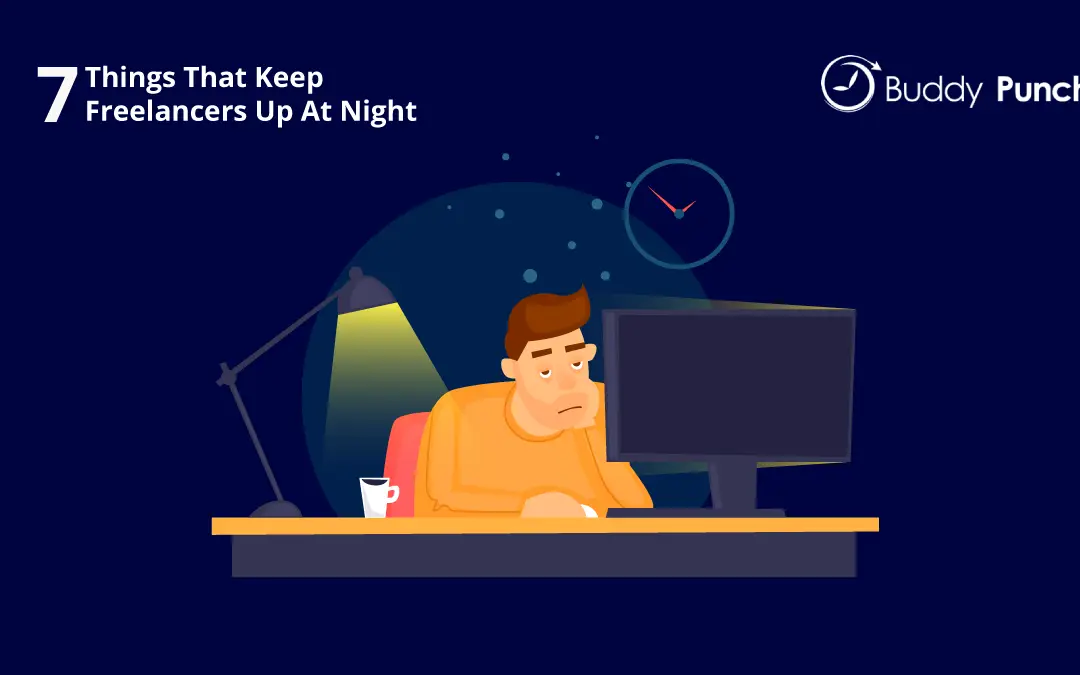7 Things That Keep Freelancers Up at Night

A recent survey of U.S. workers showed that around 35% consider themselves “freelancers.” Freelancing offers many benefits, like being able to dictate your schedule and a greater flexibility to explore new avenues. However, as with any job, there are highs and lows, pros and cons. Freelancing brings with it a lot of stress since there is never really any true guarantee of work or security. It can also be a bit lonely, depending on the avenue of freelancing you have chosen. Anxieties often take hold and keep many freelancers up at night. What are some of the most common troublesome issues freelancers deal with, and how can you address them?
1. Money
One of the major concerns for most freelancers is managing income flow. For some people, balancing a budget and managing funds comes naturally. However, the majority of freelancers seem to struggle with this, as the cash flow generally varies.
Professionals recommend putting a third of your pay into savings for times when work is not so readily available. Freelancing is a lot less stressful when you have some money in the bank during low periods.
2. Lack of Work
The other major worry freelancers come across is lack of work.
When you are lucky enough to have excess work, remember to only take the work that you can handle. Learn how to say “no.” Another good thing to remember is not to rush through any job. It does not pay in the long run to rush through a job – a lot of times you end up with an unhappy client who will not return to you.
One of the best perks of being a freelancer is that there is nothing saying you must go to work every day. Learn to enjoy downtime when you get it.
3. The Future
For freelancers, the future can be quite worrisome and concerning. It is common to worry about how you will continue to find new clients, advance your career, or find job satisfaction.
Something that will tremendously help secure a more reliable future is to foster and grow relationships. This means building relationships with clients; they will be more likely to continue working with you in the future if they feel they have some type of personal connection to you. Also, build relationships with other freelancers. They often have great ideas or job opportunities that they are willing to share with you and vice versa.
4. Rejection
As a freelancer, you tend to work with several clients at a time. It can be difficult to balance several projects, and your client’s needs or budget may change. For these reasons, rejection is just part of the job.
You must come to the realization that rejection will definitely happen, but it is extremely important not to take it personally. Do not get discouraged; keep working and moving forward.
5. Loneliness
Depending on the avenue of freelancing you do, it can be a lonely business. At times, you may go a week without speaking to another human.
When you work from home instead of in a traditional office setting, it is often more difficult to want to join in on social gatherings. However, to some extent, human companionship is vital for your sanity. Find a way to enjoy some type of activity or companionship in a non-work-related social group.
6. Unhappy clients
At some point in your freelance career, you will come across unsatisfied clients. They will tell you that you did not meet their standards or expectations, and not all of them will be polite and professional about it. Obviously, remain professional yourself and do everything in your power to satisfy the client.
To do this, you must learn how to handle criticism. Everyone has room to grow and improve. Be honest enough with yourself to realize constructive criticism when you receive it; grow from it. On the opposite side, there will always be a hyper-critical client who will never be happy, no matter what you do. Remember not to take it personally.
7. Deadlines
Deadlines in freelancing are commitments – they are not suggestions. You must deliver on time, no matter what.
To help you manage your deadlines, be practical. Be sure to leave room for “life” to happen – computers crash, you get sick, family emergencies happen, etc. Stick to your deadline. One good way to do this is to have some type of way to handle and organize your scheduling or appointments. This way, no one gets overlooked and you can make other plans – both work and non-work related.